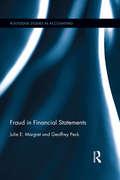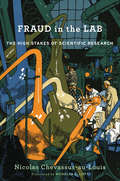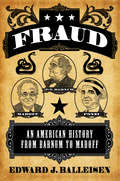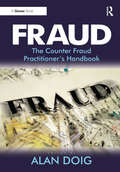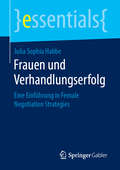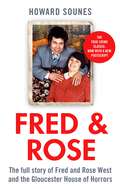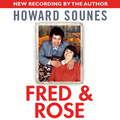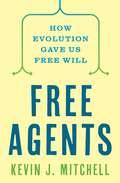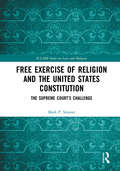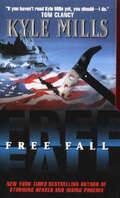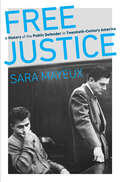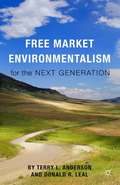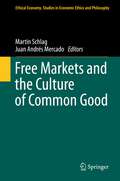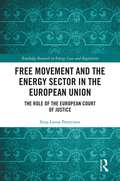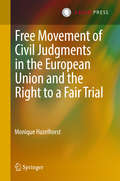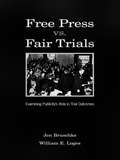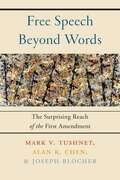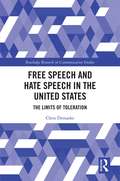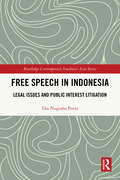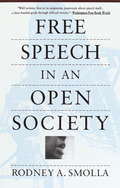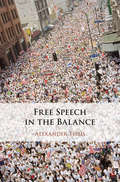- Table View
- List View
Fraud in Financial Statements (Routledge Studies in Accounting)
by Julie E. Margret Geoffrey PeckAs the monetary cost of fraud escalates globally, and the ensuing confidence in financial markets deteriorates, the international demand for quality in financial statements intensifies. But what constitutes quality in financial statements? This book examines financial statement fraud, a topical and increasingly challenging area for financial accounting, business, and the law. Evidence shows that accounting anomalies in an organization’s financial statements diminish the quality and serviceability of financial information. However, an anomaly does not necessarily signal fraud. Financial statement fraud is intended to mislead shareholders and other stakeholders. In this book, elements that underpin diversity of accounting anomalies likely found in fraudulent financial accounting statements are revealed. Multiple research methods are used in the analysis of selected international fraud cases, each illustrating examples of financial statement fraud, including: revenue recognition, overstatement and/or misappropriation of assets, understatement of expenses and liabilities, disclosure fraud, bribery and corruption. Additionally, the phoenix phenomenon with regard to fraud in financial accounting is investigated. Drawing on documented observations of commercial and legal cases globally this study highlights the necessity for continued development of financial audit practices and other audit services.
Fraud in the Lab: The High Stakes of Scientific Research
by Nicolas Chevassus-au-LouisFrom manipulated results and fake data to retouched illustrations and plagiarism, cases of scientific fraud have skyrocketed in the past two decades. In a damning exposé, Nicolas Chevassus-au-Louis details the circumstances enabling the decline in scientific standards and highlights efforts to curtail future misconduct.
Fraud: An American History from Barnum to Madoff
by Edward J. BalleisenThe United States has always proved an inviting home for boosters, sharp dealers, and outright swindlers. Worship of entrepreneurial freedom has complicated the task of distinguishing aggressive salesmanship from unacceptable deceit, especially on the frontiers of innovation. At the same time, competitive pressures have often nudged respectable firms to embrace deception. As a result, fraud has been a key feature of American business since its beginnings. In this sweeping narrative, Edward Balleisen traces the history of fraud in America—and the evolving efforts to combat it—from the age of P. T. Barnum through the eras of Charles Ponzi and Bernie Madoff. Starting with an early nineteenth-century American legal world of "buyer beware," this unprecedented account describes the slow, piecemeal construction of modern regulatory institutions to protect consumers and investors, from the Gilded Age through the New Deal and the Great Society. It concludes with the more recent era of deregulation, which has brought with it a spate of costly frauds, including the savings and loan crisis, corporate accounting scandals, and the recent mortgage-marketing debacle. By tracing how Americans have struggled to foster a vibrant economy without enabling a corrosive level of fraud, this book reminds us that American capitalism rests on an uneasy foundation of social trust.
Fraud: The Counter Fraud Practitioner's Handbook (Crime And Society Ser.)
by Alan DoigFraud: The Counter Fraud Practitioner's Handbook looks at fraud investigation methods and explores the practical options for preventing and remedying fraud. An effective fraud and financial crime strategy involves intelligence and prevention, criminal and civil legal procedures, and asset recovery, all of which may involve investigators, internal auditors, security managers, in-house and external legal counsel and advisors. Your strategy depends on the outcomes you are seeking, the nature of the fraud or crime committed and the countries involved. Fraud provides a clear picture of the role of compliance, civil and criminal legal process in any fraud strategy. Chapters then cover investigation strategies for each of the following types of fraud: benefit, health, procurement, employee, telecoms, fiscal, corporate, charity, legal and accounting. Part Three explores the practical options for fraud prevention and remediation, including both civil and criminal asset recovery. This is an essential reference for both public and private sector fraud and security specialists who need to understand the strengths and weaknesses of each element of their organization's strategy against fraud and are seeking to learn from the approach of their colleagues in other industries or organizations. Written by and for practitioners, it is a handbook that deals with the knowledge, detail and the craft that underpins all effective anti-fraud work.
Fraudulent Evidence Before Public International Tribunals
by W. Michael Reisman Christina Parajon SkinnerDomestic lawyers are, above all, officers of the court. By contrast, the public international lawyer representing states before international tribunals is torn between loyalties to the state and loyalties to international law. As the stakes increase for the state concerned, the tension between these loyalties can become acute and lead to practices that would be condemned in developed national legal systems but have hitherto been ignored by international tribunals in international legal scholarship. They are the 'dirty stories' of international law. This detailed and contextually sensitive presentation of eight important cases before a variety of public international tribunals dissects some of the reasons for the resort to fraudulent evidence in international litigation and the profession's baffling reaction. Fraudulent evidence is resorted to out of greed, moral mediocrity or inherent dishonesty. In public international litigation, by contrast, the reasons are often more complex, with roots in the dynamics of international politics.
Frauen und Verhandlungserfolg: Eine Einführung In Female Negotiation Strategies (Essentials)
by Julia Sophia HabbeTäglich muss jeder von uns verhandeln. Dabei macht es einen Unterschied, ob Männer oder Frauen dies tun. So neigen Frauen dazu, sich mit schlechteren Ergebnissen zufrieden zu geben als Männer. Nach der Forschung lässt sich das mit dem gesellschaftlichen Rollenbild erklären. Wenn Frauen in Konflikten „tough“ auftreten, fürchten sie, ihrem Rollenbild nicht zu entsprechen und negative Gegenreaktionen – zum Beispiel in Form von Sympathieverlust – hervorzurufen (so genannter Backlash-Effekt). Welchen Ausweg gibt es? Dieser Frage geht die genderspezifische Verhandlungsforschung nach. Die Forschungsergebnisse werden in dem vorliegenden essential so vorgestellt, dass sie von jeder Leserin in einer Verhandlungssituation genutzt werden können.Die Autorin Dr. Julia Sophia Habbe ist spezialisiert auf Konfliktlösung, Prozessführung sowie interne Untersuchungen. Sie ist Partnerin einer internationalen Wirtschaftskanzlei in Frankfurt am Main und Lehrbeauftragte der Johann Wolfgang Goethe-Universität im Bereich genderspezifische Verhandlungsführung.
Fred & Rose: The Full Story of Fred and Rose West and the Gloucester House of Horrors
by Howard SounesFRED & ROSE IS THE DEFINITIVE ACCOUNT OF THIS INFAMOUS TRUE CRIME CASE - NOW UPDATED WITH A POSTSCRIPT FROM THE AUTHOR. AS FEATURED ON TV, AND IN THE PODCAST SERIES, UNHEARD: THE FRED & ROSE WEST TAPESFred and Rose West are virtually unique in British criminal history: a husband and wife who loved and killed together.During their long relationship, the Wests murdered a series of young women, burying the remains of nine victims under their home at 25 Cromwell Street, Gloucester, including those of their daughter. What was left of Fred West's eight-year-old stepdaughter was dug up from under the Wests' previous Gloucester home; his first wife and nanny were buried in open country. Most victims had been decapitated and dismembered, their remains showing signs of sexual torture. These twelve are just the ones police found when the Wests were arrested in 1994. There may be more whose bones have not been located . . . Howard Sounes broke the first major story about the Wests as a journalist, and covered the murder trial of Rosemary West, before writing Fred & Rose, the definitive account of this infamous case. Beginning with Fred's and Rose's bizarre childhoods, Sounes charts their lives and crimes in forensic detail, creating a fascinating and truly frightening account of a marriage soaked in blood.
Fred & Rose: The Full Story of Fred and Rose West and the Gloucester House of Horrors
by Howard SounesFRED & ROSE IS THE DEFINITIVE ACCOUNT OF THIS INFAMOUS TRUE CRIME CASE - NOW UPDATED WITH A POSTSCRIPT FROM THE AUTHOR. AS FEATURED ON TV, AND IN THE PODCAST SERIES, UNHEARD: THE FRED & ROSE WEST TAPESFred and Rose West are virtually unique in British criminal history: a husband and wife who loved and killed together.During their long relationship, the Wests murdered a series of young women, burying the remains of nine victims under their home at 25 Cromwell Street, Gloucester, including those of their daughter. What was left of Fred West's eight-year-old stepdaughter was dug up from under the Wests' previous Gloucester home; his first wife and nanny were buried in open country. Most victims had been decapitated and dismembered, their remains showing signs of sexual torture. These twelve are just the ones police found when the Wests were arrested in 1994. There may be more whose bones have not been located . . . Howard Sounes broke the first major story about the Wests as a journalist, and covered the murder trial of Rosemary West, before writing Fred & Rose, the definitive account of this infamous case. Beginning with Fred's and Rose's bizarre childhoods, Sounes charts their lives and crimes in forensic detail, creating a fascinating and truly frightening account of a marriage soaked in blood.
Free Agents: How Evolution Gave Us Free Will
by Kevin J. MitchellAn evolutionary case for the existence of free willScientists are learning more and more about how brain activity controls behavior and how neural circuits weigh alternatives and initiate actions. As we probe ever deeper into the mechanics of decision making, many conclude that agency—or free will—is an illusion. In Free Agents, leading neuroscientist Kevin Mitchell presents a wealth of evidence to the contrary, arguing that we are not mere machines responding to physical forces but agents acting with purpose.Traversing billions of years of evolution, Mitchell tells the remarkable story of how living beings capable of choice arose from lifeless matter. He explains how the emergence of nervous systems provided a means to learn about the world, granting sentient animals the capacity to model, predict, and simulate. Mitchell reveals how these faculties reached their peak in humans with our abilities to imagine and to be introspective, to reason in the moment, and to shape our possible futures through the exercise of our individual agency. Mitchell&’s argument has important implications—for how we understand decision making, for how our individual agency can be enhanced or infringed, for how we think about collective agency in the face of global crises, and for how we consider the limitations and future of artificial intelligence.An astonishing journey of discovery, Free Agents offers a new framework for understanding how, across a billion years of Earth history, life evolved the power to choose, and why it matters.
Free Culture: How Big Media Uses Technology and the Law to Lock Down Culture and Control Creativity
by Lawrence LessigDiscusses the ramifications of copyright law for culture. The author of this book donated a digital copy of this book. Join us in thanking Lawrence Lessig for providing his accessible digital book to this community.
Free Exercise of Religion and the United States Constitution: The Supreme Court’s Challenge (ICLARS Series on Law and Religion)
by Mark P. StrasserThe United States is extremely diverse religiously and, not infrequently, individuals sincerely contend that they are unable to act in accord with law as a matter of conscience. The First Amendment to the United States Constitution protects the free exercise of religion and the United States Supreme Court has issued many decisions exploring the depth and breadth of those protections. This book addresses the Court’s free exercise jurisprudence, discussing what counts as religion and the protections that have been afforded to a variety of religious practices. Regrettably, the Court has not offered a principled and consistent account of which religious practices are protected or even how to decide whether a particular practice is protected, which has resulted in similar cases being treated dissimilarly. Further, the Court’s free exercise jurisprudence has been used to provide guidance in interpreting federal statutory protections, which is making matters even more chaotic. This book attempts to clarify what the Court has said in the hopes that it will contribute to the development of a more consistent and principled jurisprudence that respects the rights of the religious and the non-religious.
Free Expression, Globalism and the New Strategic Communication
by Monroe E. PriceVast changes in technologies and geopolitics have produced a wholesale shift in the way states and other powerful entities think about the production and retention of popular loyalties. Strategic communication has embraced these changes as stakes increase and the techniques of information management become more pervasive. These shifts in strategic communications impact free speech as major players, in a global context, rhetorically embrace a world of transparency, all the while increasing surveillance and modes of control, turning altered media technologies and traditional media doctrines to their advantage. Building on examples drawn from the Arab Spring, the shaping of the Internet in China, Iran's perception of foreign broadcasting, and Russia's media interventions, this book exposes the anxieties of loss of control, on the one hand, and the missed opportunities for greater freedom, on the other. "New" strategic communication arises from the vast torrents of information that cross borders and uproot old forms of regulation. Not only states but also corporations, nongovernmental organizations, religious institutions, and others have become part of this new constellation of speakers and audiences.
Free Fall
by Kyle MillsFrom the #1 New York Times bestselling author of Vince Flynn's Mitch Rapp SeriesIt's bold. It's dangerous. It's the kind of maverick operation that has made Mark Beamon both the FBI's best agent and its least-likely-to-succeed screw-up.A top-secret FBI file -- buried in an anonymous government warehouse since J. Edgar Hoover's death -- is missing. The unlucky grad student who uncovered it is dead, and now his ex-girlfriend is on the run, accused of the murder. The only man everyone agrees can find the young woman and turn up the explosive document is "off-duty," suspended and under the threat of prosecution by the bureau itself.Beamon knows better than anyone that this is his last shot to save his career -- and his country. Tracking the young woman down, though, will be the hardest assignment he's ever tackled, for she's a gutsy world-class rock-climber who can drop out of sight anywhere in the world. And even if he finds her and the file, who can he trust when the FBI itself is under suspicion? Beamon has no room for wrong guesses -- or moves. If he blows this one, he'll free fall straight out of the bureau -- and straight into prison....
Free Justice: A History of the Public Defender in Twentieth-Century America (Justice, Power, and Politics)
by Sara MayeuxEvery day, in courtrooms around the United States, thousands of criminal defendants are represented by public defenders--lawyers provided by the government for those who cannot afford private counsel. Though often taken for granted, the modern American public defender has a surprisingly contentious history--one that offers insights not only about the "carceral state," but also about the contours and compromises of twentieth-century liberalism. First gaining appeal amidst the Progressive Era fervor for court reform, the public defender idea was swiftly quashed by elite corporate lawyers who believed the legal profession should remain independent from the state. Public defenders took hold in some localities but not yet as a nationwide standard. By the 1960s, views had shifted. Gideon v. Wainwright enshrined the right to counsel into law and the legal profession mobilized to expand the ranks of public defenders nationwide. Yet within a few years, lawyers had already diagnosed a "crisis" of underfunded, overworked defenders providing inadequate representation--a crisis that persists today. This book shows how these conditions, often attributed to recent fiscal emergencies, have deep roots, and it chronicles the intertwined histories of constitutional doctrine, big philanthropy, professional in-fighting, and Cold War culture that made public defenders ubiquitous but embattled figures in American courtrooms.
Free Market Environmentalism for the Next Generation
by Terry L. Anderson Donald R. LealThis book provides a vision for environmentalism's future, based on the success of environmental entrepreneurs around the world. The work provides the next generation of environmental market ideas and the chapters are co-authored with young scholars and policy analysts who represent the next generation of environmental leaders.
Free Markets and the Culture of Common Good
by Juan Andrés Mercado Martin SchlagRecent economic development and the financial and economic crisis require a change in our approach to business and finance. This book combines theology, economy and philosophy in order to examine in detail the idea that the functioning of a free market economy depends upon sound cultural and ethical foundations. The free market is a cultural achievement, not only an economic phenomenon subject to technical rules of trade and exchange. It is an achievement which lives by and depends upon the values and virtues shared by the majority of those who engage in economic activity. It is these values and virtues that we refer to as culture. Trust, credibility, loyalty, diligence, and entrepreneurship are the values inherent in commercial rules and law. But beyond law, there is also the need for ethical convictions and for global solidarity with developing countries. This book offers new ideas for future sustainable development and responds to an increasing need for a new sense of responsibility for the common good in societal institutions and good leadership.
Free Movement and the Energy Sector in the European Union: The Role of the European Court of Justice (Routledge Research in Energy Law and Regulation)
by Sirja-Leena PenttinenThis book analyses the case-law of the European Court of Justice on free movement in the energy sector. Sirja-Leena Penttinen provides a comprehensive review of the interpretation and application of the free movement provisions in the energy sector by the European Court of Justice (ECJ), which allow for cross-border energy trade (free movement of goods) and energy investments (free movement of capital). Through detailed analysis of ECJ case-law, Penttinen tracks the development of the legislative framework at EU level in response to the growth of the energy sector, as well as exposing the various political and economic nuances at play. In addition, she sheds light on the dynamic relationship between the EU Member States and their regulatory autonomy, the EU legislator, the Commission and the Court in the establishment of the EU internal energy market. Taking a coherent, systematic approach, this volume will be of great interest to scholars of EU law and energy policy, as well as policymakers and professionals working in this sector.
Free Movement of Civil Judgments in the European Union and the Right to a Fair Trial
by Monique HazelhorstThis book examines the attainment of complete free movement of civil judgments across EU member states from the perspective of its conformity with the fundamental right to a fair trial. In the integrated legal order of the European Union, it is essential that litigants can rely on a judgment no matter where in the EU it was delivered. Effective mechanisms for cross-border recognition and the enforcement of judgments provide both debtors and creditors with the security that their rights, including their right to a fair trial, will be protected. In recent years however, the attainment of complete free movement of civil judgments, through simplification or abolition of these mechanisms, became a priority for the European legislator. The text uniquely combines a thorough discussion of EU legislation with an in-depth and critical examination of its interplay with fundamental rights. It contains an overview and comparison of both ECtHR and CJEU case law on the right to a fair trial, and provides a great number of specific recommendations for current and future legislation. With its critical discussion of EU Regulations from both a practical and a theoretical standpoint, this book is particularly relevant to legislators and policymakers working in this field. Because of the extensive overview of the functioning of the EU's mechanisms and of relevant case law it provides the book is also highly relevant to academics and practitioners. Monique Hazelhorst is Judicial Assistant at the Supreme Court of the Netherlands. She studied Law and Legal Research at Utrecht University and holds a Ph. D. in Law from the Erasmus School of Law at Erasmus University Rotterdam.
Free Press Vs. Fair Trials: Examining Publicity's Role in Trial Outcomes (Routledge Communication Series)
by Jon Bruschke William Earl LogesCurrent research on media and the law has generally been atheoretical and contradictory. This volume explains why pretrial publicity is unlikely to affect the outcome of most jury trials, despite many experimental studies claiming to show the influence of publicity. It reviews existing literature on the topic and includes results from the authors' own research in an effort to answer four questions: *Does pretrial publicity bias the outcome of trials? *If it has an effect, under what conditions does this effect emerge? *What remedies should courts apply in situations where pretrial publicity may have an effect? *How does pretrial publicity relate to broader questions of justice? Reporting research based on actual trial outcomes rather than on artificial laboratory studies, Free Press vs. Fair Trials examines publicity in the context of the whole judicial system and media system. After a thorough review of research into pretrial publicity, the authors argue that the criminal justice system's remedies are likely to be effective in most cases and that there are much larger obstacles confronting defendants than publicity. This book presents the first extensive study of the influence of pretrial publicity on actual criminal trials, with results that challenge years of experimental research and call for more sophisticated study of the intersection of media and criminal justice. It is required reading for scholars in media law, media effects, legal communication, criminal justice, and related areas.
Free Speech Beyond Words: The Surprising Reach of the First Amendment
by Mark V. Tushnet Alan K. Chen Joseph BlocherA look at First Amendment coverage of music, non-representational art, and nonsenseThe Supreme Court has unanimously held that Jackson Pollock’s paintings, Arnold Schöenberg’s music, and Lewis Carroll’s poem “Jabberwocky” are “unquestionably shielded” by the First Amendment. Nonrepresentational art, instrumental music, and nonsense: all receive constitutional coverage under an amendment protecting “the freedom of speech,” even though none involves what we typically think of as speech—the use of words to convey meaning. As a legal matter, the Court’s conclusion is clearly correct, but its premises are murky, and they raise difficult questions about the possibilities and limitations of law and expression. Nonrepresentational art, instrumental music, and nonsense do not employ language in any traditional sense, and sometimes do not even involve the transmission of articulable ideas. How, then, can they be treated as “speech” for constitutional purposes? What does the difficulty of that question suggest for First Amendment law and theory? And can law resolve such inquiries without relying on aesthetics, ethics, and philosophy? Comprehensive and compelling, this book represents a sustained effort to account, constitutionally, for these modes of “speech.” While it is firmly centered in debates about First Amendment issues, it addresses them in a novel way, using subject matter that is uniquely well suited to the task, and whose constitutional salience has been under-explored. Drawing on existing legal doctrine, aesthetics, and analytical philosophy, three celebrated law scholars show us how and why speech beyond words should be fundamental to our understanding of the First Amendment.
Free Speech and Hate Speech in the United States: The Limits of Toleration (Routledge Research in Communication Studies)
by Chris DemaskeFree Speech and Hate Speech in the United States explores the concept and treatment of hate speech in light of escalating social tensions in the global twenty-first century, proposing a shift in emphasis from the negative protection of individual rights toward a more positive support of social equality. Drawing on Axel Honneth’s theory of recognition, the author develops a two-tiered framework for free speech analysis that will promote a strategy for combating hate speech. To illustrate how this framework might impact speech rights in the U.S., she looks specifically at hate speech in the context of symbolic speech, disparaging speech, internet speech and speech on college campuses. Entering into an ongoing debate about the role of speech in society, this book will be of key importance to First Amendment scholars, and to scholars and students of communication studies, media studies, media law, political science, feminist studies, American studies, and history.
Free Speech and Unfree News
by Sam LebovicDoes America have a free press? Many who say yes appeal to First Amendment protections against censorship. Sam Lebovic shows that free speech, on its own, is not sufficient to produce a free press and helps us understand the crises that beset the press amid media consolidation, a secretive national security state, and the daily newspaper's decline.
Free Speech in Indonesia: Legal Issues and Public Interest Litigation (Routledge Contemporary Southeast Asia Series)
by Eka Nugraha PutraThis book discusses the practice of free speech and its limitations – defamation and hate speech – in the context of Indonesia.Focusing on several legislations, mainly in the Indonesian Criminal Code (KUHP) and the Information and Electronic Transaction Law (The ITE Law), the analysis centers on defamation and hate speech and how public interest defense is implemented in such limitations. The book discusses free speech in Indonesia through historical context and legal framework, both national and international. Detailed analyses of laws and case studies are provided, and the author examines key judicial decisions in defamation and hate speech cases that occurred in offline and online realms. The book demonstrates that Indonesia has ratified international human rights frameworks but that democracy in Indonesia has been declining in recent years, particularly due to the restrictions on free speech imposed by laws, which has resulted in a significant increase in cases involving free speech limitations.Offering a much-needed analysis of free speech and its implementation in Indonesia, this book will be of interest to academics studying Southeast Asia, Indonesia, Human Rights, Media Law, and Law in Asia.
Free Speech in an Open Society
by Rodney A. SmollaThis grand tour of First Amendment law underlines the intimate connection between free expression and democratic values as it leads us through the most treacherous and emotionally charged cases in American jurisprudence. “Intellectually venturesome. . . . ”—The New York Times Book Review
Free Speech in the Balance
by Alexander TsesisFree Speech in the Balance is the first comprehensive study of proportional analysis in free speech theory. This book challenges the US Supreme Court's categorical approach and explains the importance of understanding the breadth of concerns arising from regulations directly and indirectly impacting expression. The author provides in-depth analysis of some of the important social and political principles governing topics of vital concern, including campaign financing, university speech codes, secondary school rules, incitement, and threats. This book should be read by students and scholars of free speech theory and anyone interested in learning more about the history of existing law, the issues of current importance, and trends in expressive significance.
